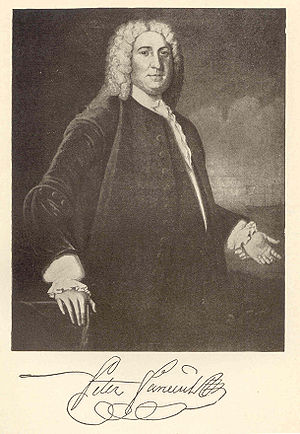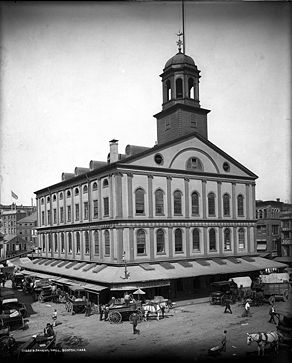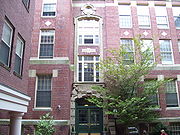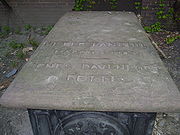
Peter Faneuil
Encyclopedia

Faneuil Hall
Faneuil Hall , located near the waterfront and today's Government Center, in Boston, Massachusetts, has been a marketplace and a meeting hall since 1742. It was the site of several speeches by Samuel Adams, James Otis, and others encouraging independence from Great Britain, and is now part of...
to Boston.
Childhood
The eldest child of one of three HuguenotHuguenot
The Huguenots were members of the Protestant Reformed Church of France during the 16th and 17th centuries. Since the 17th century, people who formerly would have been called Huguenots have instead simply been called French Protestants, a title suggested by their German co-religionists, the...
brothers who fled France
France
The French Republic , The French Republic , The French Republic , (commonly known as France , is a unitary semi-presidential republic in Western Europe with several overseas territories and islands located on other continents and in the Indian, Pacific, and Atlantic oceans. Metropolitan France...
with considerable wealth after the 1685 revocation of the Edict of Nantes
Edict of Fontainebleau
The Edict of Fontainebleau was an edict issued by Louis XIV of France, also known as the Revocation of the Edict of Nantes. The Edict of Nantes of 1598, had granted the Huguenots the right to practice their religion without persecution from the state...
, Peter Faneuil was born on June 20, 1700 in New Rochelle, New York
New Rochelle, New York
New Rochelle is a city in Westchester County, New York, United States, in the southeastern portion of the state.The town was settled by refugee Huguenots in 1688 who were fleeing persecution in France...
to Benjamin Faneuil and Anne Bureau. Having emigrated to America about a decade earlier and become freemen of Massachusetts Bay in 1691, Peter's father, Benjamin, and his uncle, Andrew, had subsequently been early settlers of New Rochelle. Shortly thereafter, Andrew made Boston his permanent residence. Benjamin married Anne Bureau in 1699 and they had at least two sons and three daughters who lived to maturity.
Little is known of Peter's boyhood. His father, prominent and fairly well-to-do, died in 1719 when Peter was 18, and soon Peter, his brother, Benjamin Jr., and his sister Mary moved to Boston. Their widowed, childless uncle Andrew had become one of New England's wealthiest men through shrewd trading and Boston real estate investments. Andrew may have formally adopted his two nephews. Peter Faneuil's first claim to fame occurred in 1728 when he helped his brother-in-law Henry Phillips escape to France after he killed Benjamin Woodbridge in the first duel ever to take place in Boston.
Life as a Merchant
Peter Faneuil entered Boston's commission and shipping business and soon proved a competent trader, assisting his uncle in running a lucrative mercantile establishment that traded with AntiguaAntigua
Antigua , also known as Waladli, is an island in the West Indies, in the Leeward Islands in the Caribbean region, the main island of the country of Antigua and Barbuda. Antigua means "ancient" in Spanish and was named by Christopher Columbus after an icon in Seville Cathedral, Santa Maria de la...
, Barbados
Barbados
Barbados is an island country in the Lesser Antilles. It is in length and as much as in width, amounting to . It is situated in the western area of the North Atlantic and 100 kilometres east of the Windward Islands and the Caribbean Sea; therein, it is about east of the islands of Saint...
, Spain
Spain
Spain , officially the Kingdom of Spain languages]] under the European Charter for Regional or Minority Languages. In each of these, Spain's official name is as follows:;;;;;;), is a country and member state of the European Union located in southwestern Europe on the Iberian Peninsula...
, the Canary Islands
Canary Islands
The Canary Islands , also known as the Canaries , is a Spanish archipelago located just off the northwest coast of mainland Africa, 100 km west of the border between Morocco and the Western Sahara. The Canaries are a Spanish autonomous community and an outermost region of the European Union...
, and England
England
England is a country that is part of the United Kingdom. It shares land borders with Scotland to the north and Wales to the west; the Irish Sea is to the north west, the Celtic Sea to the south west, with the North Sea to the east and the English Channel to the south separating it from continental...
, only a few of the places from which Faneuil's correspondence survives.
Prominent in the Triangular trade
Triangular trade
Triangular trade, or triangle trade, is a historical term indicating among three ports or regions. Triangular trade usually evolves when a region has export commodities that are not required in the region from which its major imports come...
, Peter shipped slaves to the West Indies
Caribbean
The Caribbean is a crescent-shaped group of islands more than 2,000 miles long separating the Gulf of Mexico and the Caribbean Sea, to the west and south, from the Atlantic Ocean, to the east and north...
and brought molasses and sugar to the Colonies
Thirteen Colonies
The Thirteen Colonies were English and later British colonies established on the Atlantic coast of North America between 1607 and 1733. They declared their independence in the American Revolution and formed the United States of America...
. He handled merchandise from Europe and the Caribbean, exported rum, fish, and produce, and engaged in shipbuilding. When he ventured both ship and cargo in transatlantic or coastal commerce, he customarily shared the risk with others. Charging 5% for handling consignments, he used advanced business methods and kept careful records. Fishing-grounds agents kept him informed of market prices and furthered his commercial connections. Not all of his trade was legal. When in 1736 his ship Providence was seized for exchanging fish and oil for French gold, he complained that only the "caprice" of the admiralty judge, a "Vile" man, was responsible for "Impositions" on a "fair trader" that was "in no way founded on law and justice."
A childless widower, Andrew Faneuil for some reason threatened to disinherit either of his two nephews if they married. Benjamin Jr. preferred wedlock to a share of the enormous Faneuil fortune, which in addition to ships, shops, and a mansion in Tremont Street included £14,000 in East India Company
British East India Company
The East India Company was an early English joint-stock company that was formed initially for pursuing trade with the East Indies, but that ended up trading mainly with the Indian subcontinent and China...
stock. During his uncle's final illness Peter managed Andrew's business as well as his own. Peter, who was swarthy, stocky, and disabled since childhood, remained single, inheriting most of the fortune. Peter became–despite handsome bequests to his sisters–one of America's wealthiest men, living sumptuously in a Beacon Street mansion. For the five brief years of life that remained to him after his uncle's death in February 1738 he lived up to the name of one of his best ships: The Jolly Batchelor. Writing to his London
London
London is the capital city of :England and the :United Kingdom, the largest metropolitan area in the United Kingdom, and the largest urban zone in the European Union by most measures. Located on the River Thames, London has been a major settlement for two millennia, its history going back to its...
partners to inform them of his uncle's death, he also requested five pipes of Madeira wine
Madeira wine
Madeira is a fortified Portuguese wine made in the Madeira Islands. Some wines produced in small quantities in California and Texas are also referred to as "Madeira", or "Madera", although those wines do not conform to the EU PDO regulations...
: "As this wine is for the use of my house, I hope you will be careful that I have the best." Soon thereafter, he requested a "handsome chariot" emblazoned with the family crest, accompanied by a coachman unlikely "to be debauched with strong drink, rum, etc." as were most European servants. He also asked for "the latest, best book of the several sorts of cookery, which pray let be of the largest characters, for the benefit of the maid's reading."
Faneuil Hall and other Gifts

Faneuil Hall
Faneuil Hall , located near the waterfront and today's Government Center, in Boston, Massachusetts, has been a marketplace and a meeting hall since 1742. It was the site of several speeches by Samuel Adams, James Otis, and others encouraging independence from Great Britain, and is now part of...
, which opened in September 1742, scarcely six months before his death. In July 1740 Faneuil had offered the town a large market building. This offer was by no means uncontroversial: Bostonians had debated throughout the eighteenth century whether a centralized market was preferable to the conveniences, such as home delivery, and inconveniences, including noisy push-cart hucksters and higher prices, of peddling in the streets. Markets built by the town had been destroyed by a mob disguised as clergymen in 1737. Only by a vote of 367 to 360 did the Boston Town Meeting accept Faneuil's offer. The building took two years to construct and was named for Faneuil after his death. It was gutted by fire in March 1761; the walls remained, but the interior structure, to which the town meeting frequently adjourned to protest British policy as the American Revolution approached, was added after the fire. The room above the market stalls became a civic center where so many prerevolutionary meetings were held that Faneuil Hall became known as America's "Cradle of Liberty." Faneuil Hall still stands, although it is dwarfed by the Quincy Market complex built behind it in the nineteenth century.

Trinity Church, Boston
Trinity Church in the City of Boston, located in the Back Bay of Boston, Massachusetts, is a parish of the Episcopal Diocese of Massachusetts. The congregation, currently standing at approximately 3,000 households, was founded in 1733. The current rector is The Reverend Anne Bonnyman...
, to which he belonged, and was treasurer of the project to build the present King's Chapel
King's Chapel
King's Chapel is "an independent Christian unitarian congregation affiliated with the Unitarian Universalist Association" that is "unitarian Christian in theology, Anglican in worship, and congregational in governance." It is housed in what was formerly called "Stone Chapel", an 18th century...
. Other wealthy Boston Anglicans
Anglicanism
Anglicanism is a tradition within Christianity comprising churches with historical connections to the Church of England or similar beliefs, worship and church structures. The word Anglican originates in ecclesia anglicana, a medieval Latin phrase dating to at least 1246 that means the English...
apparently lacked his fervor, for the project languished for five years after his death following his gift of £200 sterling.
Death

Edema
Edema or oedema ; both words from the Greek , oídēma "swelling"), formerly known as dropsy or hydropsy, is an abnormal accumulation of fluid beneath the skin or in one or more cavities of the body that produces swelling...
in 1743, being interred in the Granary Burying Ground
Granary Burying Ground
Founded in 1660, the Granary Burying Ground in Massachusetts is the city of Boston's third-oldest cemetery. Located on Tremont Street, it is the final resting place for many notable Revolutionary War-era patriots, including three signers of the Declaration of Independence, Paul Revere and the five...
. The unmarried Faneuil left his fortune, including five black slaves and 195 dozen bottles of wine, to his sister Mary and brother Benjamin Jr. (later to become a became a Loyalist
Loyalist (American Revolution)
Loyalists were American colonists who remained loyal to the Kingdom of Great Britain during the American Revolutionary War. At the time they were often called Tories, Royalists, or King's Men. They were opposed by the Patriots, those who supported the revolution...
), who ironically enjoyed his uncle's bequest far more than his short-lived brother. Nineteenth-century historian Lucius M. Sargent said of Peter Faneuil that he "lived as magnificently as a nobleman, as hospitably as a bishop, and as charitably as an apostle."

